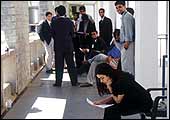 |
| Alan Noddle, Royal Ahold: Veteranspeak |
How big an operation can you
run with 160 employees at the headquarters? If you were Royal Ahold,
a Euro 67 billion retail empire spanning 9,000 stores in 28 countries.
Founded in 1887, by Albert Heijn, the Dutch retailer has grown through
joint ventures and acquisitions. Last fortnight, its recently-retired
executive vice president, Alan Noddle, was in India
to deliver a talk at KSA-Technopak's Retail Summit 2002. BT's
R. Sridharan caught up with the industry
veteran to find out Ahold's experience in emerging markets. Excerpts:
Q. Is Ahold planning an entry into India?
A. It's too early for us to be in this
market. With our business model, we need a premier local operator
who has demonstrated consistent growth and profitability, and who
has a desire to join hands with a global partner. So for us the
most important thing is astute local management and successful enterprise,
which we don't think India has at the moment. Secondly, the infrastructure
isn't yet sophisticated...in trucking and transportation, wholesaling,
and warehousing.
How
has your experience been in other Asian countries like Malaysia
and Indonesia?
We have some good partners and some that aren't
as astute in retailing as they should be. In Malaysia we now own
all of the (joint venture) company. In Thailand we have a partner,
and in Indonesia you can't have a partner but you can have a technical
assistance agreement. We have over 110 stores in all those countries
already and continuing to grow. Indonesia is close to break even,
Thailand is profitable, and Malaysia is still not profitable.
0-12
Thank Rowling
The Harry Potter Effect seems to be working. |
|
In the 1990s children's literature in India was symbolised
by books of the R.L. Stine kind. Then Harry Potter happened.
''After Potter, we expect an increase in demand,'' says Thomas
Abraham, of Penguin India, which is relaunching its Puffin
series. Other's haven't been idle either. Scholastic India
is pushing the cause of India-specific children's books through
book clubs and relationships with schools. Rupa plans to publish
two children's books every month. And to think everything
started with a boy named Potter.
-T.R. Vivek
|
How would you compare India to these countries?
Retailing there is far ahead compared to India.
One of the problems India has is that it's always comparing itself
to itself. All of yesterday, people were telling me that you should
have been here three-four years back. Look how fast we've grown.
Yeah, but the other parts of the world aren't standing still. In
your own region against China, Philippines, Malaysia, and Indonesia,
India is way below.
Since 1999-2001, Ahold has done huge several
of acquisitions worldwide. Why not in Asia?
Simply because the availability is not there.
You only have one large player in the whole of Asia-Dairy Farm of
Hong Kong. And they have their own problems. They just got out of
New Zealand, Australia, and are suffering terribly in Hong Kong.
How is Peapod, the internet grocer you acquired
in 2000, doing?
Much better than before. What we've done is
linked (Peapod) with our local operating companies, so the customer
gets the trust of the local brand name that they've been shopping
in for years and the ability to shop through the internet with home
delivery.
In the auto industry, we keep hearing that
there is room enough only for six players. Is something like that
going to happen in retail?
Oh, yes. There are going to be only five-six
retailers left in the world and in my opinion those will be: Wal-Mart,
Carrfoure, Ahold, Tesco, and maybe Casino and Shawn get together,
maybe not. That doesn't mean there won't be successful local or
national companies. But global food retailers, there will only be
five or six.
SMALL TECH
The trouble with cranky radios
They were supposed to take tech
to the masses. But two Indian-made handheld devices, once celebrated,
now resemble vapourware on the long, hard road to market.
 |
| Vinay Despande: Great idea, but when
will it hit the market? |
Some
said it would be ''Alladin's lamp in the hands of the poor''. An
MIT brain declared it ''should be more than adequate to meet any
foreseeable computing, internet, or web need in any developing nation
within the next five or more years''. Time magazine said ''mass
adequacy never sounded so good''.
Srikanth Manikatti isn't quite so euphoric
about the made-in-India hand-held device called the Simputer (simple
inexpensive mobile computer). Manikatti, a leading hardware vendor
in the city of the Simputer's birth, Bangalore, says the little
computer just isn't making it to the market. Nearly a year after
the Simputer was launched-on April 1, All Fools Day-in a blaze of
publicity as the computing device for ordinary folk like farmers
and fishermen, it now seems a bit of vapourware.
3x5
Part-Time Boom
Part-time opportunities bloom in unexpected
places. |
|
You wouldn't expect to find
part-timers in companies such as SmithKline Beecham Consumer
Healthcare, Gillette, Hewlett-Packard, Hughes Software, and
Shoppers' Stop. You'd be surprised, though: HSS has around
40; SKBCH, 4, and Gillette, 10. Of course, you'll also find
them in organisations like Orion Dialog, a call centre, but
this composition isn't about the predictable. It isn't just
employees who benefit from part-timing; companies do too.
''Companies gain by being able to enhance employees' work-life
balance without losing talent,'' says C. Mahalingam, VP (HR),
H-P. Still, there is, as Ishita Swarup, a director at Orion
Dialog points out, a flip-side. ''Although these jobs pay
well, companies do not promote part timers.'' And oh yes,
as sexist as it may sound, it is women employees who are driving
this trend.
-Mily Chakrabarty
|
CORP-WEAR
The Dress Patrol
Companies are increasingly monitoring what
their people wear. |
|
 The
buzz has it that a large Mumbai-based consumer goods transnational
has a dress patroller on its rolls. It is this individual's
job to ensure that employees are attired in consonance with
the corporate culture. Across India, companies are increasingly
worrying about what their people wear. Xerox and Gillette
monitor dress-discipline through line managers. ''If an employee
isn't suitably dressed, it is the job of the immediate supervisor
to point it out,'' says Arun Sehgal, Regional hr Director
(India and South Asia), Gillette. ''Some of the grooming takes
place during induction,'' explains Xerox hr-head Brij K. Chandiramani.
''And the rest in subsequent briefings by line managers.''
Big brother is just a cubicle away The
buzz has it that a large Mumbai-based consumer goods transnational
has a dress patroller on its rolls. It is this individual's
job to ensure that employees are attired in consonance with
the corporate culture. Across India, companies are increasingly
worrying about what their people wear. Xerox and Gillette
monitor dress-discipline through line managers. ''If an employee
isn't suitably dressed, it is the job of the immediate supervisor
to point it out,'' says Arun Sehgal, Regional hr Director
(India and South Asia), Gillette. ''Some of the grooming takes
place during induction,'' explains Xerox hr-head Brij K. Chandiramani.
''And the rest in subsequent briefings by line managers.''
Big brother is just a cubicle away
-Moinak Mitra
|
''We are technocrats, not entrepreneurs,'' says
Vijay Chandru, one of the inventors and a professor in the department
of computer science and automation at the Indian Institute of Science.
''We have formed the Simputer trust and the basic code is available
to anybody who wants to download it from the web. It is now up to
others to commercialise the device.''
And whose responsibility is that? Vinay Deshpande,
founding member of the Simputer Trust is also the CEO of Encore
Software, and one of the men tasked to take it to the market. Deshpande
says the Simputer will be ready to hit the market in a couple of
months after his techies make modifications to the initial prototype.
That includes a colour screen, doubling battery life to 10 hours
using AA-size batteries (instead of AAA), changed ergonomics, doubling
memory to 64 VRAM and 32 flash, and an additional extendable port
to attach it to other devices. ''The user interface has also been
improved to make it more intuitive,'' says Deshpande.
''We have been making some modifications to
the initial prototype developed.'' Deshpande claims that there has
been ''enormous demand'' for the device, but lack of governmental
support has been a hindrance. ''We have requested the government
to waive the 16 per cent excise tax and the 4 per cent sales tax.
If this is accepted, the cost of the device will come down by a
fifth,'' he says. Encore's colour-screen version of the Simputer
will then cost Rs 18,000. That's just too costly, says Manikatti.
''One can actually purchase a low-end assembled desktop for that
price.''
Another wannabe mass-computing device that's
stuttering is the iStation from Bangalore's iNabling Technologies.
Priced at Rs 7,000, it was supposed to revolutionise net access
and ''bridge the digital divide'', in the words B.V. Jagadeesh,
famed US techie and angel investor, who is one of the main promoters
of the iStation.
Unlike the Simputer, the iStation was a commercial
product from the start, but a year since its launch, iNabling Technologies
has sold less than 100. Vendors complain that the company hasn't
paid their dues. ''They want to offload those unsaleable devices
in exchange for office stationery material I have supplied to them,''
says one aggrieved vendor who requested anonymity. The iStation's
main drawback was that it could not take graphics, pictures, and
colour. Critics says its like being fobbed off with a cranky radio
in the age of colour television. Despite repeated attempts, the
company officials were not available to BT for comments. What was
that people say about the old Indian failing of not following through
on great ideas?
-Venkatesha Babu
PLACEMENTS 2002
Missing The B-School Rush
Initial placement results indicate that this
will be a lean season for the Class of 2002, at India's B-schools.
 |
| Tense student at the Indian Institute of Management,
Bangalore |
Across
the top business schools in the country, there's just one prayer
on the lips of students and placement officers. It's not about eye-popping
salaries, foreign postings, or even plum consultancy jobs. The plea
is altogether simple: 100 per cent placement. Yes, as industry battles
a bad slowdown and infotech companies cut back on recruitment in
the face of vanishing projects, B-schools are going through a relatively
dry placement season. Although placements aren't over at most B-schools,
the first flush of results paint a grim picture. At IIM-Bangalore,
the Class of 2002, is getting initial offers between Rs 6 lakh and
Rs 11 lakh per annum. (At iim-Ahmedabad, placements hadn't yet begun
when BT went to press.) Says Arvind Thippanaik, 24, who's taking
up Johnson & Johnson's offer of Rs 6.8 lakh per annum: ''I thought
it would be a blood-bath because of the downturn. In comparison
to, say, IIM-Lucknow, we are doing much better.'' Things at tier-two
B-schools are expected to turn out much worse.
One B-school that had students, recruiters,
and even rival institutions watching it was the Hyderabad-based
Indian School of Business, whose first one-year MBA batch passes
out this year. Placement data was still being compiled at ISB when
BT went to press, but reports suggest that the offers were significantly
below the school's and students' expectations. Better luck next
time?
  |
| Harry Potter and The Fellowship of teh
Rings: Blockbusters |
M-PICS
Hobbit Vs Boy Wizard
Two of the highest grossers ever will soon
hit Indian screens. What's in store?
First, the news
that is of relevance to the masses. Harry Potter and the Sorcerer's
Stone will open in Indian cinemas-across 100 cities-in mid-April.
And it won't be a quiet opening for the second highest grossing
film of all time ($925 million, next only to Titanic's $1,835.4
million): the release (which will happen in English, as well as
Hindi and Tamil, courtesy, dubbed versions) will be accompanied
by a blitzkrieg of promotions with companies like Mattel, Coca-Cola,
Lego, and Weekender. Now, for something that will appeal to a far
more select audience: Warner's other blockbuster, The Lord of the
Rings: The Fellowship of the Ring (seventh on the same list with
takings of $716.5 million) will open in the middle of March, only
in English, and only in 35 cities. ''The selling platform for this
will be the Oscars,'' says Blaise Fernandes, Managing Director,
Warner Brothers India referring to the motion picture's 13 Oscar
nominations. A Hindi version won't be out till June, and the only
promotion in the offing is one with MTV and the New Zealand High
Commission (The Fellowship...was shot in that country). Fernandes
claims it will be ''difficult to say'' which of the two releases
will do better, but given the contrasting promotional offerings,
and the penchant of the Indian audience for ''family-entertainment'',
it isn't hard to predict that.
-Shailesh Dobhal
INNOVATIONS
The Green Shoe Gambit
A market innovation may have made all the difference
to Bharti Televentures' issue price.
 |
| Sunil Mittal: A green shoe may have made
things better |
Green shoe option: an option granted
by a company to its underwriter giving it the right to sell 10-15
per cent more shares (than the stated size of the issue) to meet
heavy investor demand.
The day sunil
mittal rang the bell to mark the listing of the Bharti Televentures
scrip, its price rose all the way to Rs 55, before ending the day
at Rs 44.10, marginally below the issue price of Rs 45. Over the
next two weeks, it went down further, and was quoting at Rs 42.65
on February 25. A green shoe option could have made all the difference
in this case. Put simply, such an instrument allows the underwriter
enter the market short. If the price goes up, the underwriter can
exercise the option and cover the short at the issue price (Rs 45
in the case of Bharti Televentures). If the price falls, the underwriter
can cover the short by buying the stock at the prevailing market
price. The rationale? As Hemendra Kothari, Chairman, DSP Merrill
Lynch and one of the lead book runners to Bharti Televentures' 100
per cent bookbuilding issue puts it: ''Provision of green shoe option
would enable us stabilise the share price in the market.'' In effect,
the book runners or underwriters play the role of market makers
to the issue. An accepted norm in the global markets, the primary
markets committee has written to SEBI suggesting that the green
shoe option (so named after the Green Shoe Company that was the
first to issue such an option) be allowed in India. Thus far, no
go.
-Roshni Jayakar
|

